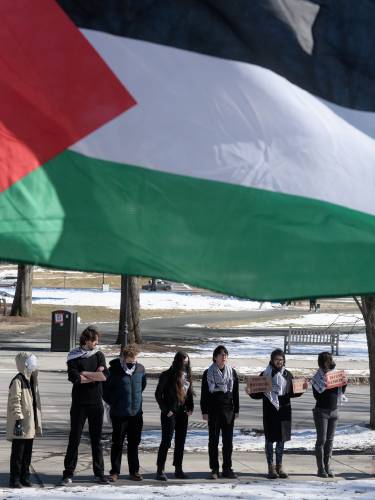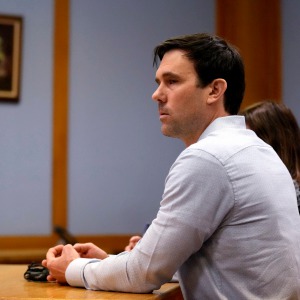Editorial: Dartmouth’s puzzling prosecution of protesters

Seven of eight Dartmouth College students declared the start of a hunger strike in solidarity with Palestinians in Gaza during a rally at noon in front of Parkhurst Hall in Hanover, N.H., Feb. 19, 2024. Among their demands of the college administration are dropping charges against two students were arrested while protesting on the Parkhurst Hall lawn in October, "divestment from Israeli apartheid" and recognizing and protecting Palestinian students during the ongoing Israeli response in Gaza over the Oct. 7 attack by Hamas. (Valley News - James M. Patterson) Copyright Valley News. May not be reprinted or used online without permission. Send requests to permission@vnews.com. James M. Patterson
|
Published: 03-15-2024 9:48 PM
Modified: 03-16-2024 9:06 PM |
It’s a great mystery why Dartmouth College, the new home of “brave spaces” for public debate, continues to pursue the criminal prosecution of a pair of peaceful pro-Palestinian student protesters accused of trespassing on their own campus.
The mystery is deepened by the Hanover Police Department’s refusal to release the relevant arrest records even though four-and-a-half months have passed and the trial of the two students has begun (although it is currently in recess). This stonewalling — which gives rise to the conjecture that the police are colluding with the college to withhold embarrassing information — extends to rebuffing public record requests made by the Valley News and asking a court to resolve the matter. The newspaper’s lawyer is now compelled to argue for release of the records in that venue, with the timeline uncertain.
Finally, it’s more than puzzling why new Dartmouth President Sian Leah Beilock, author of the brave spaces initiative, would risk alienating a whole segment of the college community by stifling dissent.
Without a better explanation, we surmise that some combination of bad judgment and bad faith is at work.
Here’s what we know (or think we know, absent the arrest records). Hanover police were summoned by college officials in the small hours of the morning of Oct. 28 to arrest the two students, freshman Kevin Engel and junior Roan Wade, who refused to vacate a tent pitched on the lawn of Parkhurst Hall, the administration building. Engel and Wade were protesting the Israel-Hamas conflict and making other demands of the college. They were charged with criminal trespass, a misdemeanor, and have pleaded not guilty.
The initial pretext for the arrests was that the pair somehow posed a threat of violence. The slim reed supporting this assertion seems to be that Engel and Wade were associated with a group whose manifesto promised “physical action” if the college failed to meet its demands for social justice by a specific date.
One would have hoped that college administrators were familiar with the fact that many social movements employ various kinds of nonviolent physical action to further their goals. (If not, maybe that’s a topic for a special Martin Luther King Day program for college officials next year.)
More recently, Dean of the College Scott Brown wrote that, “After discussions with these students, we now understand that they are consistently nonviolent activists.” So why didn’t those discussions take place in good faith before the arrests were made? Even Richard Nixon left the White House one night during the Vietnam era to talk with the anti-war protesters he loathed.
Article continues after...
Yesterday's Most Read Articles
When the trial began, the rationale had shifted. The college’s security chief testified that he told the activists that their refusal to leave the tent presented safety issues, such as interfering with people entering the building and preventing the grounds crew from mowing the lawn. (If so, we stand in awe of a grounds crew that mows lawns in the middle of the night in late October in New Hampshire.)
Keiselim Montas, director of the Department of Safety & Security, also testified that Beilock and other high-ranking college officials met for about an hour before police were summoned in an effort to figure out what to do about the protesters. It makes sense that the college’s most senior executives would be present; arresting students is a serious matter.
What doesn’t make sense is that Beilock’s lawyer has twice moved to quash the subpoena issued by the students’ lawyer to compel her testimony in the case. Initially her lawyer argued that she had “no relevant testimony” to offer, a notion rejected by the trial judge. Indeed, it is hard to imagine that the students would have been arrested had she not at least signed off on that step. But now her lawyer asks the judge to reconsider.
A college spokesman recently explained Dartmouth’s refusal to ask the prosecution to dismiss the charges on the grounds that the right to free speech “exists in the context of the law and in responsibility for one’s own actions.” If the object is to teach students to take responsibility for their actions under the law, then Beilock should embrace the duty — the opportunity — to model that behavior by willingly providing testimony.
Dartmouth’s motto is “the voice of one crying in the wilderness.” The line comes from Isaiah, one of those angry Old Testament prophets who raised their lonely voices to rail against injustice. We think that, by their lights, these two young students were doing exactly that. We wonder why the college is intent on repudiating them.

 Editorial: Parker parole a reminder of how violence reshapes our lives
Editorial: Parker parole a reminder of how violence reshapes our lives Editorial: Chris Sununu’s moral vacuum
Editorial: Chris Sununu’s moral vacuum Editorial: Gambling tarnishes America’s sporting life
Editorial: Gambling tarnishes America’s sporting life By the Way: A white nationalist’s many mistruths
By the Way: A white nationalist’s many mistruths
